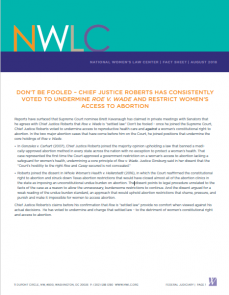Abortion rights, women of color, and LGBTQI+ people are under attack. Pledge to join us in fighting for gender justice.
 Reports have surfaced that Supreme Court nominee Brett Kavanaugh has claimed in private meetings with Senators that he agrees with Chief Justice Roberts that Roe v. Wade is “settled law.” Don’t be fooled – once he joined the Supreme Court, Chief Justice Roberts voted to undermine access to reproductive health care and against a woman’s constitutional right to abortion. In the two major abortion cases that have come before him on the Court, he joined positions that undermine the core holdings of Roe v. Wade.
Reports have surfaced that Supreme Court nominee Brett Kavanaugh has claimed in private meetings with Senators that he agrees with Chief Justice Roberts that Roe v. Wade is “settled law.” Don’t be fooled – once he joined the Supreme Court, Chief Justice Roberts voted to undermine access to reproductive health care and against a woman’s constitutional right to abortion. In the two major abortion cases that have come before him on the Court, he joined positions that undermine the core holdings of Roe v. Wade.
- In Gonzales v. Carhart (2007), Chief Justice Roberts joined the majority opinion upholding a law that banned a medically-approved abortion method in every state across the nation with no exception to protect a woman’s health. That case represented the first time the Court approved a government restriction on a woman’s access to abortion lacking a safeguard for women’s health, undermining a core principle of Roe v. Wade. Justice Ginsburg said in her dissent that the “Court’s hostility to the right Roe and Casey secured is not concealed.”
- Roberts joined the dissent in Whole Woman’s Health v. Hellerstedt (2016), in which the Court reaffirmed the constitutional right to abortion and struck down Texas abortion restrictions that would have closed almost all of the abortion clinics in the state as imposing an unconstitutional undue burden on abortion. The dissent points to legal procedure unrelated to the facts of the case as a reason to allow the unnecessary, burdensome restrictions to continue. And the dissent argued for a weak reading of the undue burden standard, an approach that would uphold abortion restrictions that shame, pressure, and punish and make it impossible for women to access abortion.
Chief Justice Roberts’s claims before his confirmation that Roe is “settled law” provide no comfort when viewed against his actual decisions. He has voted to undermine and change that settled law – to the detriment of women’s constitutional right and access to abortion.

